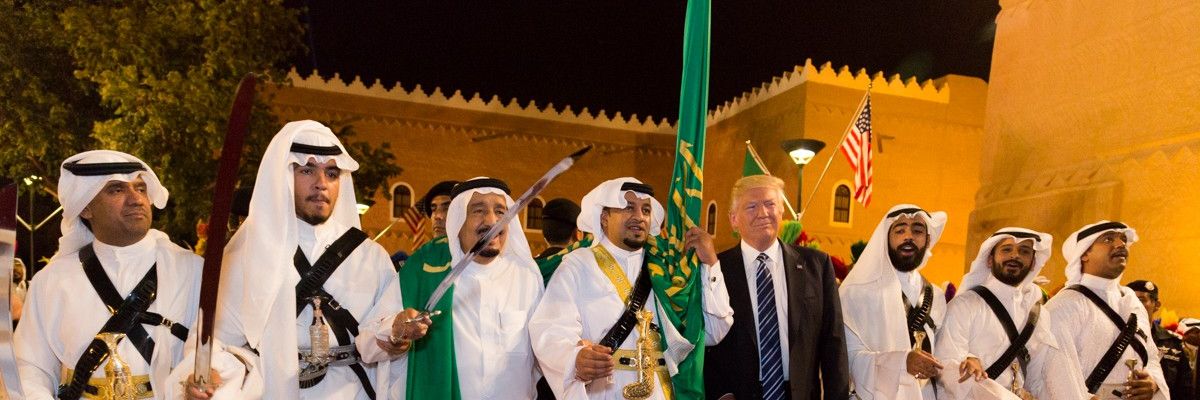The United States’ unconditional support for Saudi Arabia allows the regime in Riyadh to pursue domestic politics and regional policies that are detrimental and counterproductive to both countries. Under the umbrella of unconditional American support, Saudi Arabia behaves badly and Washington loses credibility, not only in Saudi Arabia but also in the Middle East.
Absent the scrutiny of the power that arms and continues to support it, Crown Prince Muhammad bin Salman has been able to eliminate dissenting voices in the kingdom, silence a nascent feminist movement, detain critical religious scholars, and launch a humiliating campaign against his royal rivals.
Even the crown prince’s purported responsibility for assassinating journalist Jamal Khashoggi in October 2018 at the kingdom’s consulate in Istanbul did not appear to embarrass President Trump. He was quick to adopt the regime’s description of Khashoggi as enemy of the state after casting doubt on whether the crown prince was responsible for giving the order to murder Khashoggi.
“It could very well be that the crown prince had knowledge of this tragic event — maybe he did and maybe he didn’t,” Trump said at the time, summarizing how Washington approached a crime of this magnitude.
Trump continued to ignore important reports by both the CIA and U.N. agencies, and remained unwilling to compromise his personal relationship with the Saudi crown prince. Consequently, the Trump administration assured Saudi Arabia that the crime was never going to change the close ties that had been developed, while Riyadh thwarted any attempt to seek justice and punish the perpetrators of this heinous murder.
The U.S. is the biggest supplier of arms to Saudi Arabia and has been for over half a century. But such arms have never been used by the Saudi military without help from the suppliers.
In 1991 Saudi Arabia was not able to defend its borders when Saddam Hussein invaded Kuwait. Only after a 500,000-strong international military force was assembled, the majority of whom were American, and dispatched to Saudi Arabia, did the country feel secure. Since then, Saudi Arabia has increased its military budgets and capacity, benefiting above all American. weapon manufacturers.
However, in 2015, Saudi Arabia started testing its own military capabilities. It deployed its U.S.-manufactured weapons in the war on Yemen, now in its fifth year, without securing the quick victory that the regime expected. U.S. silence over Saudi atrocities in Yemen proved to be a good cover under which Riyadh can continue to launch airstrikes on one of the poorest countries in the Arab world, precipitating a humanitarian crisis of great magnitude.
Washington’s unconditional support for Riyadh allows the latter to pursue an aggressive regional policy in the Arab world. Since Muhammad bin Salman became crown prince in 2017, he fractured the Gulf Cooperation Council, established in 1983, with the blessing of the U.S. to strengthen the Gulf region’s defenses against Iran.
However, the Saudis under the crown prince broke Gulf consensus and cooperation when a dispute with Qatar escalated. Saudi Arabia, the UAE, and Bahrain led one camp against Qatar, with the remaining two GCC states, Kuwait and Oman, desperately trying to push for a reconciliation.
While Washington largely sat on the sidelines, Iran was able to forge a rapprochement with the ostracized Qatar, an outcome that Washington perhaps never anticipated. As the formation of the GCC was meant to protect the Gulf states against Iran and enhance Washington’s interests in the region, it is evident that the Saudi crown prince is actually acting alone without regard to U.S. interests. Yet he remains cushioned in Washington. But why?
Washington hopes that the crown prince becomes pivotal in imposing the Trump-Kushner peace plan on the Israelis and Palestinians. However, Washington has bet on a horse that is unlikely to deliver. Riyadh has never been and will never be the capital where peace can be promoted between Israelis and Palestinians. Even if Riyadh intensifies its clandestine relations with Israel, it is not capable of delivering an outcome that satisfies the Palestinians.
Riyadh’s relations with the various Palestinian factions are hardly amicable at the moment and not many Palestinians look to the crown prince for support. The state-controlled Saudi press continues to demonize Palestinians and blame them for their plight. Such an approach is hardly capable of creating an atmosphere of trust that allows frank and constructive negotiations, should such negotiations start in the near future.
A facilitator of peace is by definition someone who stands at equal distance from the contestants at the negotiating table. The crown prince is far from being a negotiator as his record so far proves that he is a bully rather than skilled mediator or facilitator.
Washington’s support for Riyadh needs to be guided by a new principle of conditionality that is linked to Riyadh acknowledging that domestic repression is counterproductive, even if it may have given the crown prince the illusion of internal stability for the moment. Prolonged repression can only backfire and destabilize the kingdom.
Furthermore, it is not in the U.S. national interest to turn a blind eye to the regime’s aggression in the region and failed diplomacy to reconcile with Gulf neighbors that produced a fractured Gulf and increased Iranian influence of the region.
Any support and arm sales that Washington may contemplate should be conditional on the crown prince respecting international norms and values. Washington’s national interest in the long-term rests on having partners in the Arab world that are reconciled with both their domestic constituencies and regional neighbors.
















